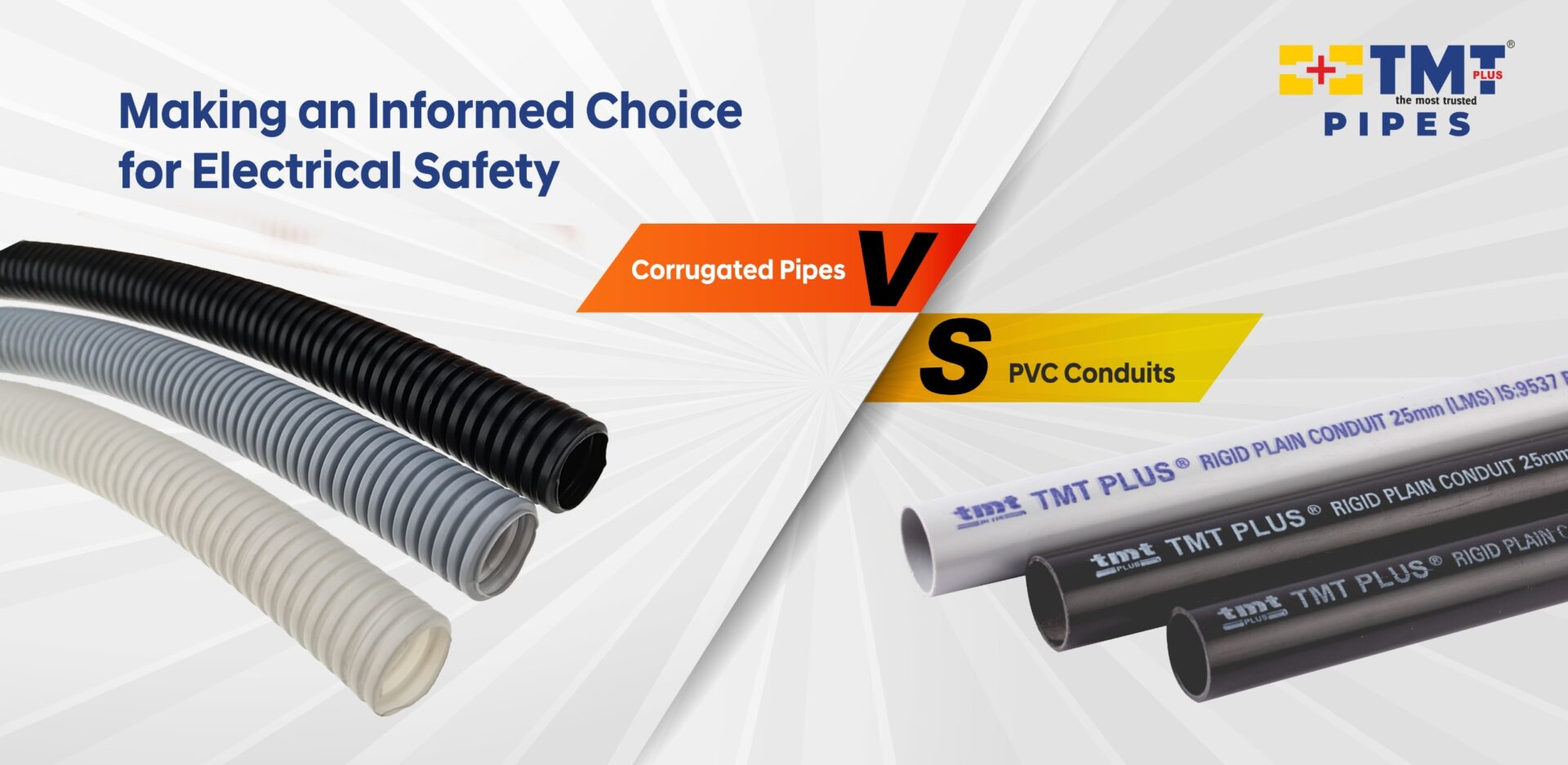 As the world rapidly evolves, the demand for residential and commercial spaces continues to grow. While design often takes centre stage, safety, especially electrical safety, can sometimes be overlooked. One of the key elements in securing any space is choosing the right electrical conduit.
As the world rapidly evolves, the demand for residential and commercial spaces continues to grow. While design often takes centre stage, safety, especially electrical safety, can sometimes be overlooked. One of the key elements in securing any space is choosing the right electrical conduit.The type of conduit used plays a crucial role in your electrical wiring system's overall safety, durability, and reliability. Among the most commonly used options are corrugated pipes and PVC conduits. Each offers unique benefits, from flexibility and ease of installation to strength and long-term performance.
Understanding the differences between the two is essential for making the right choice for your specific project, whether it’s a small DIY project or a large construction site. This blog explores the key differences between corrugated pipes and PVC conduits to help you choose the right option for your needs.
What are Corrugated Pipes?
Corrugated pipes are flexible, durable, and designed to protect electrical cables from external damage. Their ribbed exterior allows for easy bending, making them ideal for installation in tight or irregular spaces. These pipes are commonly used in industrial settings for wiring protection and in construction projects where ease of movement and adaptability are essential.What are PVC Conduits?
PVC conduits are rigid pipes made from a durable plastic material, offering reliable protection to electrical wires. They are lightweight, non-corrosive, and widely used in residential, commercial, and industrial electrical installations. PVC conduits come in various sizes and are known for their ease of installation and unmatched durability.Corrugated vs. PVC Conduits: How are They Different?
Flexibility and Bending EaseCorrugated pipes are highly flexible, making them ideal for installations in confined spaces or areas requiring sharp turns. Their structure allows them to bend without compromising structural integrity.
PVC conduits, on the other hand, are rigid and lack flexibility. They are better suited for straight-line installations and require elbow fittings for turns, adding complexity to the installation process.
Durability and Impact Resistance
Corrugated pipes are flexible and easy to install, which makes them useful in tight spaces. But because of their thinner, ribbed design, they can get damaged more easily, especially on busy construction sites where there’s a lot of heavy activity.
PVC conduits are stronger and more rigid. They handle impacts better and can be used even in tough conditions, like extreme heat or cold. That makes them a more reliable choice for long-term protection of electrical wiring.
Ease of Installation
Corrugated pipes are easy to install due to their flexibility. They can be easily threaded through walls and ceilings without the need for additional fittings or elbows.
PVC conduits require more time and effort to install. The rigid nature of PVC means that additional fittings, such as elbows and connectors, are necessary, making the installation process slightly more complex.
Cost
Corrugated pipes are generally more affordable than PVC conduits. Their cost-effectiveness makes them a popular choice for projects with budget constraints, especially in large-scale installations.
PVC conduits, although slightly more expensive than corrugated pipes, offer excellent long-term value. Their durability, strength, and resistance to environmental factors often justify the higher upfront cost, especially in projects where reliability and lifespan matter.
Protection Against Environmental Factors
Corrugated pipes offer good protection against moisture, dust, and light chemicals, making them suitable for some outdoor or underground applications. However, because they are often thinner and left exposed on construction sites, they can be more prone to damage, especially in rough environments.
PVC conduits, on the other hand, are highly durable and provide strong resistance to extreme temperatures, weather conditions, and many chemicals. This makes them ideal for demanding environments where long-term performance and protection are crucial.
Weight and Portability
Corrugated pipes are lightweight and flexible, making them easy to transport and install. Their bendable structure adds to their portability, especially in tight or irregular spaces.
PVC conduits, though heavier than corrugated pipes, are still much lighter than alternatives like steel or metal conduits. Their manageable weight makes them easy to handle and install, whether in small DIY projects or large-scale installations requiring multiple conduit lines.
Resistance to Corrosion
Corrugated pipes, especially polyethene-based ones, are highly corrosion-resistant, making them ideal for environments with high moisture or exposure to chemicals, ensuring long-lasting performance in challenging conditions.
PVC conduit pipes are also resistant to corrosion but can degrade when exposed to UV rays or harsh chemicals over time. Proper UV protection or covering is necessary for outdoor installations.
Fire Resistance
Corrugated pipes made from polyethene have fire-retardant properties, but they may not offer the same level of fire resistance as PVC conduits.
PVC conduits are highly fire-resistant, which is an essential feature when protecting electrical wiring. They are less likely to catch fire and can withstand higher temperatures compared to corrugated pipes.
Long-Term Performance
Corrugated pipes are designed for long-term use and can withstand various environmental challenges. However, their flexibility can sometimes lead to deformation or wear over time.
PVC conduits offer excellent long-term performance, maintaining their shape and structural integrity over many years. Their resistance to ageing and wear makes them a reliable choice for most electrical wiring needs.
Which is Better for Electrical Wiring?
The choice between corrugated pipes and PVC conduits isn’t one-size-fits-all; it depends on various factors like location, usage, environment, and duration of the installation. Each type of conduit comes with its strengths and limitations, and selecting the right one requires a clear understanding of the specific demands of your electrical setup.If your project involves tricky spaces or frequent adjustments, such as in temporary setups or compact corners, corrugated pipes offer the flexibility and ease of installation you’ll need. On the other hand, if safety, durability, and long-term performance are critical, like in permanent residential or industrial wiring, PVC conduits are a more dependable option. Their rigidity and resistance to fire, weather, and physical impact make them ideal for demanding conditions.
If your installation is exposed to harsh weather, chemicals, or extreme temperatures, PVC conduits offer superior protection due to their durability and resistance to environmental factors. On the other hand, corrugated pipes provide some protection but may not be as resilient in demanding environments, particularly if left exposed on construction sites. For outdoor or underground applications, PVC conduits are often the more reliable choice.
Budget is also a deciding factor. Corrugated pipes are more affordable and suitable for cost-sensitive projects, while PVC conduits, though slightly pricier, provide better long-term value through enhanced protection and lifespan.
Choosing the Best Pipe
Whether you choose a corrugated pipe or PVC electrical conduit pipe, here are the things you must ensure to determine what features the best pipes must have:Corrugated Pipes:
- Flexibility for easy installation in tight spaces.
- Corrosion resistance, especially for outdoor or wet environments.
- Durability to withstand physical impact and damage.
- UV resistance for exposure to sunlight.
- Compatibility with various electrical wiring.
- Ease of bending without compromising strength.
- Resistance to chemicals and moisture.
- Cost-effectiveness for budget-sensitive projects.
- Strength and rigidity for long-term protection.
- Resistance to corrosion, chemicals, and moisture.
- Fire resistance for enhanced safety.
- Durability against extreme temperatures.
- Availability in various sizes for different applications.
- Ease of installation with minimal fittings.
- UV resistance for outdoor applications.
- Compliance with safety and industry standards.



